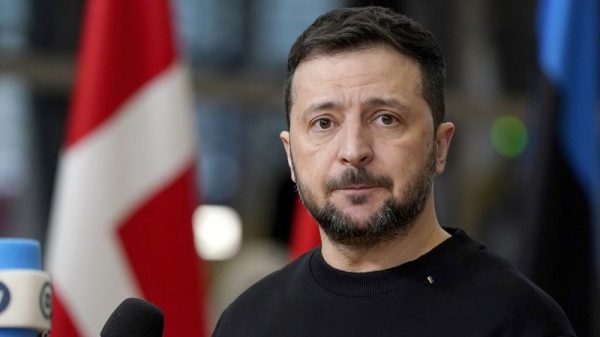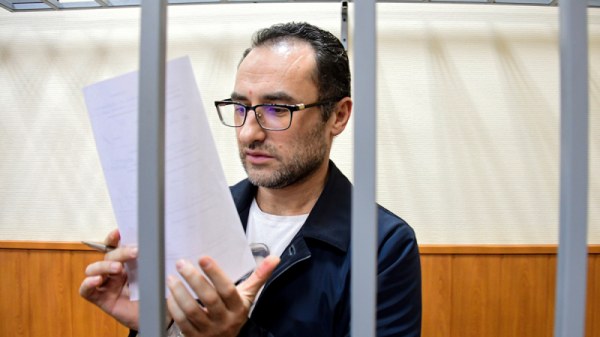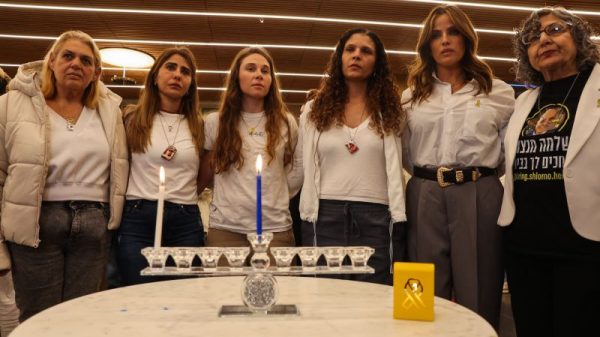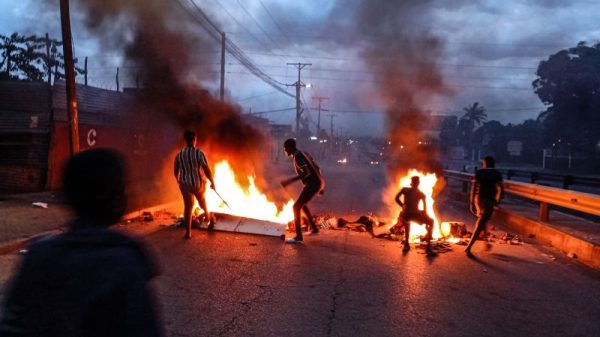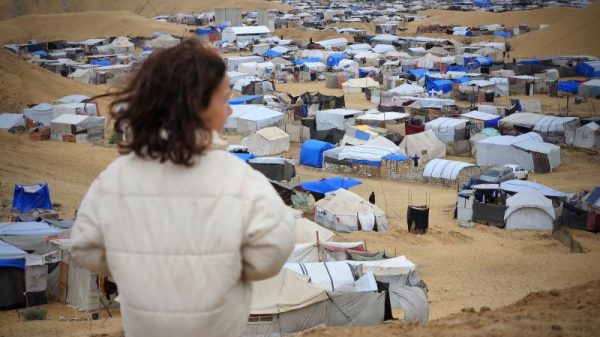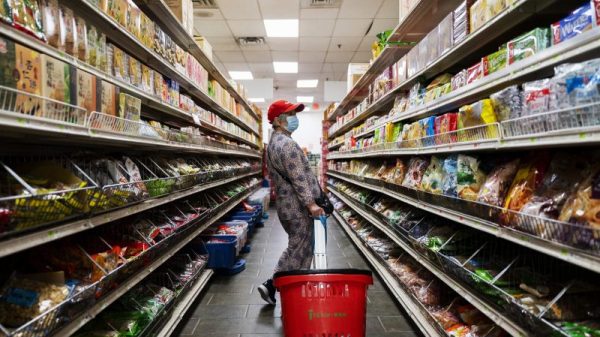Salwa Tibi recalls how she covered several miles on foot in southern Gaza, in a desperate search for blankets and sheets that might help keep her four children and other young relatives warm at night.
“I felt bad for the kids, they had nothing to keep them warm and we were dying from the cold at night,” said Tibi, who works at the humanitarian agency CARE International. She is staying in a rented house with at least 20 relatives including eight children and babies – the youngest of whom is three months old.
The kids, she said, “were screaming all day from hunger.”
Senior US officials have warned Israel to minimize civilian casualties in the south, where it has now stepped up its military campaign targeting Hamas, after previously telling Gazans to flee there from the north of the strip.
“If the situation stays this tragic, then Gaza is going to starve,” said Tibi.
Forcibly displaced Palestinians could not flee with winter clothes
Islam Saeed Muhammad Barakat did not have time to gather the belongings his family needs for winter when they fled their home in Gaza City.
The average temperature in Gaza falls to between 10°C and 20°C (50F to 68F) in December, dipping a couple of degrees lower on average in January. The rainy season typically lasts from November to February, with January the wettest month. One reporting station near the border of southern Gaza and Israel indicated nearly twice the amount of average rainfall to date, while other surrounding reporting stations to the north showed less rain than normal.
Almost 1.9 million people, more than 85% of the enclave’s total population, have been displaced since the beginning of the war, according to the UN Relief and Works Agency for Palestine Refugees (UNRWA).
More than 1.1 million of those are sheltering in facilities in central and southern Gaza, including in Khan Younis and Rafah where strikes have been reported, UNRWA said.
“I had to take off the bag I was carrying and throw it away,” said Hazem Saeed Al-Naizi, the director of an orphanage in Gaza City who was among those heading south. “People did the same thing like me, they started throwing their bags.”
Al-Naizi was forced to flee to Rafah with the 40 people under his care – most of whom are children and infants living with disabilities. He recalled being too fatigued to hold the bag, crammed with baby milk, biscuits, dates, diapers, water and clothing, at the same time as carrying one of the orphans, 8-year-old Ayas.
“The road was filled with bags, which led to people falling to the ground when they were walking,” he said.
Civilians may not have expected their displacement to last into the winter months without access to their homes, said Rebecca Inglis, an intensive care doctor in Britain who regularly visits Gaza to teach medical students. Some have resorted to searching under the rubble of destroyed buildings for blankets and other essential supplies.
Seeking shelter from the rain
Shadi Bleha has no roof to protect himself from the worsening weather. Instead, he is sheltering in the courtyard of a school.
“We try to play some games with my family and sing together … to make them happy, at least for a small time.”
Elsewhere, patches of land have turned into sprawling tent camps, where thousands of civilians are living in cramped conditions. Flash flooding caused by torrential rains spills rubbish and sewage into the streets, contaminating people’s limited food and water supplies.
Some displaced children in a tent camp in Deir Al-Balah, in southern Gaza, could be seen playing in the water following intense downpours on Tuesday.
“We are nine people living in this tent. Our tent is flooded with water, my siblings are freezing, and we don’t know what to do. We want to go back to our homes and not drown,” she said.
‘I see people starving’
Israel’s Coordinator of Government Activities in the Territories (COGAT), says it is “facilitating various humanitarian aid initiatives” to help the civilian population in Gaza, including allowing in aid deliveries – subject to security checks – supplying water and facilitating the establishment of field hospitals. On Tuesday, four tankers of fuel and two tankers of cooking gas were allowed in, as well as 195 trucks of humanitarian aid, COGAT said.
The price of food and water has surged as supplies diminish, leading to widespread hunger and dehydration. The World Food Programme declared a “catastrophic hunger crisis” in Gaza on December 5. The relief organization said it was forced to shut down its last remaining bakery because it had no fuel or gas, adding that it ran 23 bakeries before the war.
Reduced daylight hours mean people are less able to rely on solar power for generators needed to power water pumps. Tibi, the mother of four in Rafah, saves mineral water for the children and infants. The adults drink water sent through aid trucks, she said, which is “not 100% clean.”
Adults ration their meals so that children do not go hungry. “I see people starving, literally starving,” said Bleha, who eats one meal a day.
Aid workers described surviving on a diet of canned beans, bread, and hummus because they cannot cook their food without fuel. Others have set up makeshift cooking facilities in clay ovens, and over open fires, burning solid fuels like plastic, wood, garbage and cardboard instead of cooking with electricity or gas. Some use tin rocket stoves, where wood is burned in a vertical heat chamber to reduce smoke fumes, according to the UN’s children’s agency.
Those relying on solid fuels to heat indoor spaces are exposed to potential carbon monoxide poisoning, said Ghalayini. Outside, street vendors are using burnable waste for fuel, which can release toxic fumes such as black carbon. Cars powered by cooking oil or corn oil release “huge plumes of black smoke” into the atmosphere, he added.
The price of automotive transport has increased six-fold, according to Jamal Al Rozzi, executive director of the National Society for Rehabilitation, who has fled to Bani Suhelia, in the south, for his children’s safety. The cost of moving goods in carts pulled by horses or donkeys has tripled, he added.
Diseases ‘spread like wildfire’
For those already struggling to stay safe, warm and fed, illness poses an additional risk.
In crowded shelters that cannot meet basic sanitation and hygiene needs, diseases “spread like wildfire,” said Inglis, the intensive care doctor.
She anticipates an uptick in upper respiratory tract infections because coughs, colds and viruses spread more quickly when people are clustered together without proper ventilation. Civilians will be exposed to other illnesses including diarrhea and hepatitis A, as well as body lice and scabies, because they cannot wash properly, Inglis added.
Roughly 160,000 to 165,000 cases of diarrhea have been recorded among children under the age of five, a WHO official said Tuesday, describing the figure as “much more” than usual. More than 130,000 cases of respiratory tract infections and 35,000 cases of skin rashes have been recorded, the Hamas-controlled health ministry in Gaza said in a report Monday, as well as thousands of cases of chickenpox, lice and scabies.
A colleague in southern Gaza, Inglis said, had told her of treating people with wounds “full of maggots” and elderly people suffering “dehydration and exhaustion” after fleeing from the north to the south.
Vulnerable populations, including malnourished children, pregnant and menstruating women, and those with disabilities, are more likely to have symptoms that are left untreated. Israel’s complete siege and restrictions on aid entering Gaza have diminished drug supplies, leaving health workers unable to help many patients who are sick or treat those who have suffered injuries in the bombardment, increasing their risk of infection.
Barakat, in Khan Younis, said: “I and many of my children got sick with several viruses that have spread recently, namely the flu and many colds, and other unknown but painful and contagious viruses.”
Civilians with chronic illnesses including diabetes and high blood pressure are also more vulnerable to winter illnesses because the blockade has prevented access to treatment, said Inglis.
In Gaza, there are more than 2,000 cancer patients, 1,000 people with kidney disease, 50,000 people with cardiovascular disease and 60,000 diabetes patients, according to WHO. Poorly controlled Type 2 diabetes can lead to complications including skin infections, heart attacks or strokes, Inglis said, adding that patients with treatable cancer are “going to die.”
The number of functioning hospitals along the strip has plummeted from 36 to 11, WHO said.
“The entire system has been systematically destroyed in this conflict in such a way that it will take years to rebuild,” said Inglis.
Al-Rozzi said Palestinians were in a state of “fear, anxiety and pain,” adding: “They feel worthless, and they have no clear view of tomorrow, or today.”
Barakat called on the international community to protect Palestinian lives, in the hope that peace will return to Gaza.
“Enough siege, enough starvation, enough killing, enough abuse, we have the right to live,” he said. “Our children have the right to play.”













